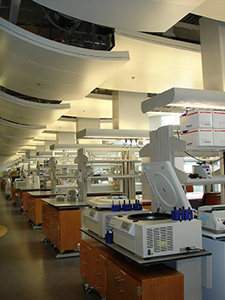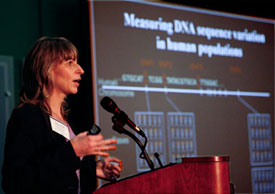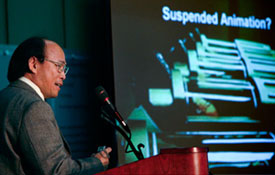Philanthropic Investment in the IMM
 The Brown Foundation Institute of Molecular Medicine for the Prevention of Human Diseases, part of the UT Health Science Center at Houston, was founded in 1995 and moved into its home, the Fayez S. Sarofim Research Building, in 2006. It is supported by competitive research grants and private philanthropy.
The Brown Foundation Institute of Molecular Medicine for the Prevention of Human Diseases, part of the UT Health Science Center at Houston, was founded in 1995 and moved into its home, the Fayez S. Sarofim Research Building, in 2006. It is supported by competitive research grants and private philanthropy.
Donors are a vital part of the research progress happening at the IMM.
There are many ways to participate with current-use support, endowment funding, and planned, estate gifts. With your gift, you join the quest for the causation, therapeutics, and prevention of the world’s most debilitating diseases.
Thank you for your interest in investing philanthropically in the IMM’s success. Together, we are seeking to cure diseases of our time in our time.
UT Researchers and Bentsen Family Take First Step Toward Stroke Treatment and Prevention
Surrounded by photographs of the late American statesman Lloyd M. Bentsen, five researchers who are breaking new ground in stroke prevention, diagnosis and treatment presented their work at a reception to celebrate the opening of the Senator Lloyd and B.A. Bentsen Center for Stroke Research Thursday evening, Jan. 22, at The University of Texas Brown Foundation Institute of Molecular Medicine for the Prevention of Human Diseases (IMM).
 Myriam Fornage, PhD associate professor of Human Genetics at the IMM, presented her team’s achievement in identifying a gene that predisposes human beings to stroke–research that will be the foundation for studies leading to stroke prevention.
Myriam Fornage, PhD associate professor of Human Genetics at the IMM, presented her team’s achievement in identifying a gene that predisposes human beings to stroke–research that will be the foundation for studies leading to stroke prevention.
 Cheng Chi Lee, PhD, professor in the Department of Biochemistry and Molecular Biology at the UT Medical School at Houston, has discovered a natural molecule that slows the metabolic rate and allows the body to cool. It is the basis for critical intervention that protects cells from damage in stroke and heart attack victims.
Cheng Chi Lee, PhD, professor in the Department of Biochemistry and Molecular Biology at the UT Medical School at Houston, has discovered a natural molecule that slows the metabolic rate and allows the body to cool. It is the basis for critical intervention that protects cells from damage in stroke and heart attack victims.
Several professors in the department of Stem Cell Research described working and applying these cells in a range of therapeutic settings, including the treatment of inflammation and degeneration of brain tissue in stroke.
Two of the scientists are working with highly sensitive new imaging technology. Eva Sevick, PhD, professor and Cullen Chair and director of Molecular Imaging, and her team have developed a technique that uses tissue-penetrating near-infrared light for rapid diagnosis of the presence of disease markers, a vital tool in diagnosing patients in emergency conditions.
WANT TO LEARN MORE?
Please contact the UTHealth Houston Development Office at 713-500-3200.